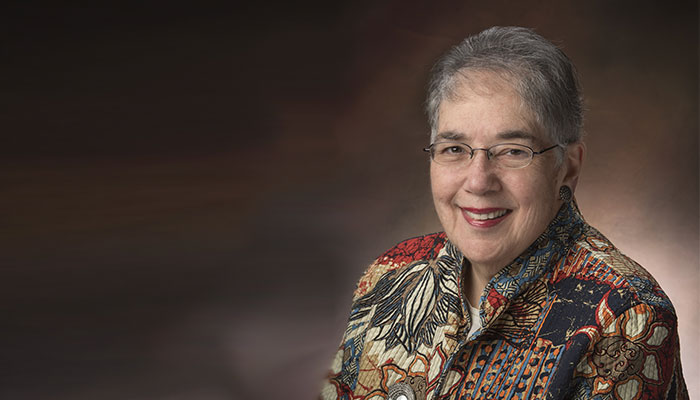HOW CAN WE HELP YOU? Call 1-800-TRY-CHOP
In This Section
‘Proud of Even the Smallest Things:’ Q&A With Elaine Zackai, MD

Dr. Elaine Zackai is celebrating 50 years at CHOP and Lifetime Achievement Award.
Elaine Zackai, MD, director of Clinical Genetics and director of the Clinical Genetics Center at Children’s Hospital of Philadelphia, celebrates her 50th year at CHOP July 1. She has published more than 600 research publications and mentored numerous physician-scientists. Dr. Zackai organized the Clinical Genetics program and built the Clinical Genetics Fellowship program at CHOP.
Earlier this year, Dr. Zackai, who also holds the Letitia B. and Alice Scott Endowed Chair in Human Genetics and Molecular Biology, was recognized for her numerous contributions to the field of medical genetics with the David L. Rimoin Lifetime Achievement Award in Medical Genetics from the American College of Medical Genetics and Genomics Foundation for Genetic and Genomic Medicine. The award recognized “her renowned expertise diagnosing birth defects and genetic disorders; her compassionate and resourceful care for patients and families; her prolific research collaboration with colleagues around the world; and her mentorship and teaching of clinicians, researchers, and genetics counselors who have in turn modeled their work on her standards for excellence.”
We sat down with Dr. Zackai to learn more about her career, accomplishments, and plans for the future. Spoiler alert: She doesn’t plan on stopping.
What led you to follow a path toward a career in clinical genetics?
I originally planned to major in mathematics in college, but once we started learning about limit theorems in calculus, I was lost. I decided to take up my second interest, which was human biology. After I completed my Bachelor of Arts in biology and chemistry at New York University, I continued my studies in medical school, also at New York University. Medical school was fun, and I knew it was the right place for me. I understood why I was doing it, and the purpose of it. It wasn’t like calculus theory; you could touch it, see it, and do it.
When I did my Pediatrics residency at St. Louis Children’s Hospital, I met David Rimoin, who had recently arrived to direct the Medical Genetics Clinic at the Washington University School of Medicine. This was in 1970, when medical genetics was an emerging specialty. I saw a field that encompassed many different specialties, and a field where I could use my love of math to figure out the chance of something happening again in a family. It was clear this was an ideal spot for me, so I began my fellowship in medical genetics, training under Dr. Rimoin.
What does this Lifetime Achievement Award represent to you?
I modeled my whole career around what I learned from David Rimoin: always putting the patient first and treasuring the exceptions that don’t fit the obvious diagnoses. I would not be where I am today without the essential foundation that he imparted to me.
I have always known myself that I was accomplishing great things as I was going along. But to have other people say it to me was very gratifying. At the Award ceremony, a colleague arranged a dinner with my former fellows and genetic counselors, and each of them spoke at the dinner. It was interesting that they all had the same message, no matter what year I worked with them. It made me realize that I created a legacy. That’s a tremendous accomplishment.
What do you think has been the biggest game changer in medical genetics since you started your career?
We’ve made a tremendous amount of progress. We’ve gone from not even knowing how many chromosomes there were to understanding how many chromosomes there are, in disorders like Down’s syndrome. Then we went from there to knowing if a piece was missing or if there was an extra piece, and we’ve learned what genes actually are there. I think the biggest change was the Human Genome Project, where they are identifying what genes are doing what. And there’s still a lot of room to continue that pursuit.
In terms of your own work, what specific research project or achievement are you most proud of?
I’m proud of even the smallest things. I’m proud to have identified that the anticonvulsant trimethadione was teratogenic and causing birth defects, which was subsequently termed fetal trimethadione syndrome. I’m proud of my work on craniosynostosis syndromes and defining syndromes related to SPECC1L, and another syndrome related to 11/22 translocation, which is the most common translocation in humans. I’m also proud of my work on 22q deletion.
But what I’m most proud of is that we are able to answer parents’ questions: What is wrong with my child? Is it going to happen again? Did I do anything to make it happen? Where do we go from here? The fact that we can answer those questions makes me happy.
What excites you most about the future of clinical genetics your career? What does the future hold for you?
The most exciting thing is just learning more about what genes are doing, and how they work, and answering questions that we didn’t know the answer to before. I’ve had individuals come back after 27 years, and we’ve found the answer. Finding out more information is always good.
The future holds me continuing this. I know many of the answers, and if I don’t know the answer, I know how to find the answer, even if it becomes a new research question. I enjoy doing that, and I’m going to keep doing it.
Why has CHOP been an ideal place for you to spend 50 years doing research?
CHOP has a very supportive environment. We are surrounded by physicians, nurses, administrative staff who are working toward one goal — to do the best for the patient and their family. I can drop into any one of my colleagues to get help with a patient, and they can do the same with me.


